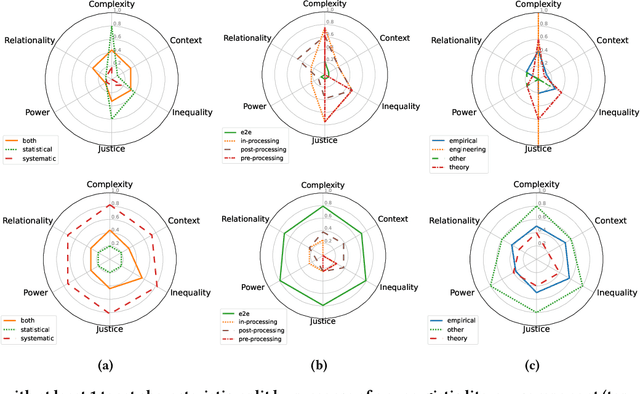Gilbert Gee
Factoring the Matrix of Domination: A Critical Review and Reimagination of Intersectionality in AI Fairness
Mar 16, 2023



Abstract:Intersectionality is a critical framework that, through inquiry and praxis, allows us to examine how social inequalities persist through domains of structure and discipline. Given AI fairness' raison d'\^etre of ``fairness,'' we argue that adopting intersectionality as an analytical framework is pivotal to effectively operationalizing fairness. Through a critical review of how intersectionality is discussed in 30 papers from the AI fairness literature, we deductively and inductively: 1) map how intersectionality tenets operate within the AI fairness paradigm and 2) uncover gaps between the conceptualization and operationalization of intersectionality. We find that researchers overwhelmingly reduce intersectionality to optimizing for fairness metrics over demographic subgroups. They also fail to discuss their social context and when mentioning power, they mostly situate it only within the AI pipeline. We: 3) outline and assess the implications of these gaps for critical inquiry and praxis, and 4) provide actionable recommendations for AI fairness researchers to engage with intersectionality in their work by grounding it in AI epistemology.
COVID-19 and Big Data: Multi-faceted Analysis for Spatio-temporal Understanding of the Pandemic with Social Media Conversations
Apr 22, 2021Abstract:COVID-19 has been devastating the world since the end of 2019 and has continued to play a significant role in major national and worldwide events, and consequently, the news. In its wake, it has left no life unaffected. Having earned the world's attention, social media platforms have served as a vehicle for the global conversation about COVID-19. In particular, many people have used these sites in order to express their feelings, experiences, and observations about the pandemic. We provide a multi-faceted analysis of critical properties exhibited by these conversations on social media regarding the novel coronavirus pandemic. We present a framework for analysis, mining, and tracking the critical content and characteristics of social media conversations around the pandemic. Focusing on Twitter and Reddit, we have gathered a large-scale dataset on COVID-19 social media conversations. Our analyses cover tracking potential reports on virus acquisition, symptoms, conversation topics, and language complexity measures through time and by region across the United States. We also present a BERT-based model for recognizing instances of hateful tweets in COVID-19 conversations, which achieves a lower error-rate than the state-of-the-art performance. Our results provide empirical validation for the effectiveness of our proposed framework and further demonstrate that social media data can be efficiently leveraged to provide public health experts with inexpensive but thorough insight over the course of an outbreak.
 Add to Chrome
Add to Chrome Add to Firefox
Add to Firefox Add to Edge
Add to Edge